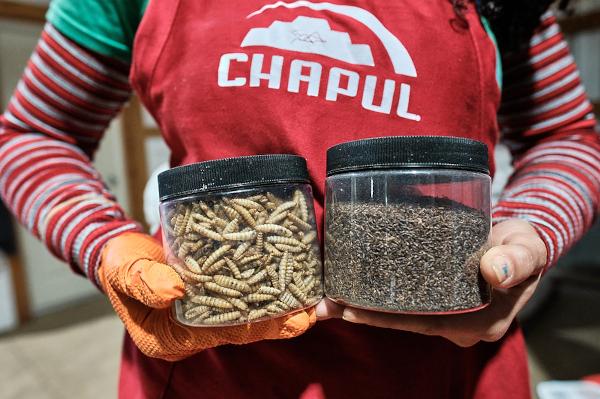
Chapul Farms is buying land for the construction a commercial insect breeding facility to produce livestock feed and soil amendments from recaptured food waste.
Funded on 10/31/2024
With a commitment to innovation, regeneration, and holistic-thinking, Chapul Farms is developing insect agriculture facilities that leverage the power of the Black Soldier Fly Larvae (BSFL) to divert discarded food waste from landfills and turn it into high-protein organic livestock feed and high-value organic soil amendments.
At the heart of Chapul Farms' mission is the desire to create a regenerative circular economy that minimizes waste and maximizes efficiency while rebuilding our world’s natural resources. The black soldier fly larvae produced in Chapul’s facilities are a fantastic source of protein for animals, and the frass—a nutrient-rich byproduct of the larvae—is an excellent organic alternative to synthetic soil fertilizers.
Also, by removing food waste from landfills, Chapul Farms reduces a significant contributor to pollution and greenhouse gas emissions. Black soldier fly larvae thrive on a diet of carbon-rich organic material—feeding it to the larvae means it is biologically digested and kept out of landfills where it would otherwise break down chemically and release greenhouse gasses.
Acquiring the land is the first step to prepare for the construction of Chapul Farms’ first commercial scale facility. This facility will harness the power of insect agriculture to biologically digest food waste—diverting waste from landfills, mitigating greenhouse gas emissions, feeding livestock, and building healthy soils.
Chapul is acquiring a 40,000 SF industrial property on 9.5 acres in McMinnville, OR. This will become the company’s first commercial-scale production facility. This loan will cover 65% of the $7.164M total acquisition cost.
Chapul Farms is dedicated to developing sustainable (net-zero) and regenerative (net-positive) initiatives, practices, and facilities. To that end, they work to ensure that all facets of their operation are beneficial to life on Earth.
Animal integration
Composting
Holistic farm/business plan
Increasing biodiversity
Pollinator habitat planting/maintenance
On-site renewable energy production
Sustainable sourcing
Food waste reduction
PROJECT PROGRESS
Design Development Completed:
The Detailed Design Development for the full facility is now complete, led by Colas Construction—known for projects like the Oregon Convention Center—and MWA Architects, whose portfolio includes major infrastructure such as the San Francisco International Airport terminal. Engineering and equipment partners include Nexus PMG and Better Insect Solutions. The next phase will focus on completing final construction documents and securing construction and operational permits.
Feedstock & Off-take Secured:
A two-year contract is in place securing 100% of the facility’s feedstock needs, along with a signed 5-year off-take agreement to purchase a portion of larvae production by an organic chicken feed company. These agreements provide long-term stability for both input and output streams as we move toward operations.
Frass Product Development:
While many BSFL companies focus primarily on protein, Chapul Farms has been a pioneer at leveraging insects as nature’s original soil producers. Known as “frass”, insect manure contains a rich, biodiverse microbial ecosystem, essential to healthy soil. Frass has a tremendous ability to replace synthetic fertilizers while enhancing plants’ natural defensive mechanisms against pests.
Organic Certification Achieved:
Chapul’s frass is now WSDA Organic and OMRI Listed, with approximately 2% chitin content—among the highest on the market. This certification underscores our commitment to producing premium soil health products that enhance plant immunity and microbial diversity.
Soil Revival Product Launch:
Our new consumer-facing label, Soil Revival, is now available for home gardeners seeking regenerative soil amendments derived from insect frass.
INVESTOR AND INDUSTRY ENGAGEMENT
-Pat Crowley, our CEO and Founder, recently traveled to Denmark with a group of Oregon stakeholders to tour several leading industrial symbiosis projects.
-Hosted a full-day Investor Event in October, welcoming attendees from across the country.
NEXT STEPS: As we move from design into the construction phase for our McMinnville facility, we remain focused on building strong partnerships and aligning resources to support long-term success. We’re grateful for the continued interest in our work and look forward to sharing more as the project progresses.
-The Chapul Farms Team
Get project announcements, farmer introductions, company updates, and more by subscribing to the Steward newsletter. Join our growing community of people who are making regenerative agriculture the foundation of our future.
Join a growing community of sustainably-minded lenders reaping the rewards from responsible farming